The foremost journal of tropical medicine in the United States has published a supplement honoring the public health legacy of former President Jimmy Carter and the late First Lady Rosalynn Carter. In a demonstration of technical expertise and the respect The Carter Center carries in that field, the supplement features 16 articles authored or co-authored by Carter Center experts. Learn more »
Helping countries control or eliminate diseases is no easy feat — helping them do so when they’re in the midst of armed conflict is exponentially more challenging. Learn more »
The Carter Center sent a large contingent to the 72nd Annual Meeting of the American Society of Tropical Medicine and Hygiene (ASTMH), held Oct. 18-22 in Chicago. Learn more »
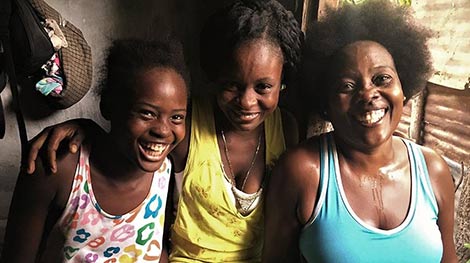 Life is hard enough in Haiti, with its profound poverty, natural disasters, and troubled political history. Add to the mix an insidious tropical disease that causes permanent disfigurement, and the result is misery that defies description.
Learn more »
Life is hard enough in Haiti, with its profound poverty, natural disasters, and troubled political history. Add to the mix an insidious tropical disease that causes permanent disfigurement, and the result is misery that defies description.
Learn more »
Jude Musa, 13, from a small community in Nigeria, stood proudly in 2016 as he received a dose of anti-parasite medicine. It was part of a ceremony marking the 500 millionth treatment The Carter Center has helped distribute to fight neglected tropical diseases. Learn more about the celebration and NTDs from our archives. Learn more »
By Dr. Kashef Ijaz, Vice President, Health Programs, The Carter Center; Kelly Callahan, M.P.H., Director, Trachoma Control Program, The Carter Center; Dr. Emmanuel Miri, Nigeria Country Representative, The Carter Center; Dr. Zerihun Tadesse, Ethiopia Country Representative, The Carter Center
From the vantage point of a richly resourced and powerful country or society, it’s easy to believe that colonialism is a thing of the past. Unfortunately, that is not the case. The sad fact is that the effects of a colonial mind-set are alive and well in some corners of the global health community. Learn more »
By Paige Alexander, chief executive officer of The Carter Center
This month, I was pleased to sign the Kigali Declaration on Neglected Tropical Diseases, signifying the Carter Center’s 100% commitment to work with dozens of countries, donors, and organizational partners to tackle these terrible diseases Learn more »
By Dr. Kashef Ijaz, vice president, Health Programs,
Haiti is frequently in the news for all the wrong reasons: devastating earthquakes, extreme poverty, rampant violent crime, political turmoil. The Carter Center is determined to bring Haiti hope in at least one way, in the area of public health. Learn more »
Seri village in Nigeria’s Plateau State marked World Neglected Tropical Diseases Day 2022 with a celebration that featured the lighting of hundreds of orange glow sticks. The village in Kanke Local Government Area joined about 100 other locales around the world that illuminated buildings and landmarks in orange to raise awareness of the fight against NTDs. Learn more »
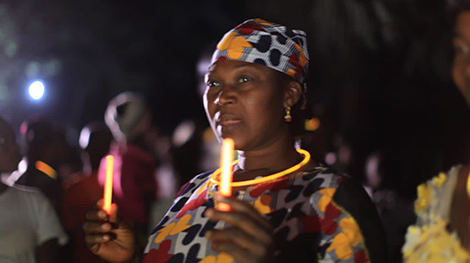 Jan. 30, 2022, marked the third annual World NTD Day, highlighting the global community’s commitment to ending neglected tropical diseases (NTDs) that cause immeasurable suffering among the world’s most marginalized communities. Together The Carter Center and our partners lit up the world as we celebrated hard-earned progress and took action to #EndtheNeglect and #BeatNTDs.
Learn more »
Jan. 30, 2022, marked the third annual World NTD Day, highlighting the global community’s commitment to ending neglected tropical diseases (NTDs) that cause immeasurable suffering among the world’s most marginalized communities. Together The Carter Center and our partners lit up the world as we celebrated hard-earned progress and took action to #EndtheNeglect and #BeatNTDs.
Learn more »
By Dr. Kashef Ijaz, vice president, health programs
Only one human disease has ever been eradicated; that was smallpox, in 1980 — a tremendous victory for humanity. The term "eradication" is defined as permanent reduction to zero of the worldwide occurrence of infection caused by a specific pathogen, with no risk of its return. Learn more »
By Paige Alexander, chief executive officer, and Kashef Ijaz, vice president, Health Programs
The 76th Session of the United Nations General Assembly opens Tuesday, Sept. 14. It is a time of great anticipation as representatives of 193 member states come together in the great hall to discuss issues and set an agenda for the coming year. World political leaders, including President Joe Biden, will give speeches that will be closely watched for clues and outright declarations regarding a wide variety of international challenges, global health among them. Learn more »
By Dr. Kashef Ijaz, vice president, health programs
The Carter Center’s neglected tropical disease programs treat and prevent Guinea worm disease, trachoma, river blindness, lymphatic filariasis, and schistosomiasis, with the goal to control, eliminate, and eradicate. Beyond the alleviation of the human suffering caused by these illnesses, this work brings ancillary benefits to communities, health systems, and infrastructure that may be just as important. Learn more »
By Paige Alexander, chief executive officer, and Kashef Ijaz, vice president, health programs
The world’s most vulnerable people work hard every day to overcome poverty and disease. They aren’t interested in handouts, but with a hand up they can get the resources they need to surmount obstacles to prosperity and peace. Learn more »
 The Carter Center is working closely with the Federal Ministry of Health in Ethiopia to eliminate river blindness (onchocerciasis) and lymphatic filariasis throughout that East African nation. Essential to the effort are thousands of volunteers called community-directed distributors, or CDDs, who are chosen by their own communities and do all the work of carefully administering medicine and keeping detailed records. Click through to meet a few of them.
Learn more »
The Carter Center is working closely with the Federal Ministry of Health in Ethiopia to eliminate river blindness (onchocerciasis) and lymphatic filariasis throughout that East African nation. Essential to the effort are thousands of volunteers called community-directed distributors, or CDDs, who are chosen by their own communities and do all the work of carefully administering medicine and keeping detailed records. Click through to meet a few of them.
Learn more »
Growing up, Greg Noland voraciously read National Geographic magazines. From his home near Dallas, Texas, Noland became fascinated with other cultures and seeing the world. Learn more »
By Dr. Kashef Ijaz, vice president, health programs
The observance of World Neglected Tropical Disease Day on Jan. 30 (following the public launch of the 2030 NTD Road Map by the WHO on Jan. 28) prompts me to reflect on my good fortune in overseeing the Carter Center’s tireless work to free people from an array of illnesses that cause untold misery and perpetuate the cycle of poverty. Learn more »
 Dedicated service is common among community volunteers and health workers with whom The Carter Center partners, but Dorçelan Offre takes it to another level. Offre, 27, will do whatever it takes to help fight malaria in his native rural Haiti, even if it means going far beyond the end of the road.
Learn more »
Dedicated service is common among community volunteers and health workers with whom The Carter Center partners, but Dorçelan Offre takes it to another level. Offre, 27, will do whatever it takes to help fight malaria in his native rural Haiti, even if it means going far beyond the end of the road.
Learn more »
Programs to combat neglected tropical diseases usually are aimed at people in villages at the end of the road and occasionally in big cities where all roads lead. But laborers in the fields of large commercial farms in Ethiopia’s Gambella region are often neither here nor there, leaving them vulnerable to contracting, and in some cases spreading, debilitating diseases. Learn more »
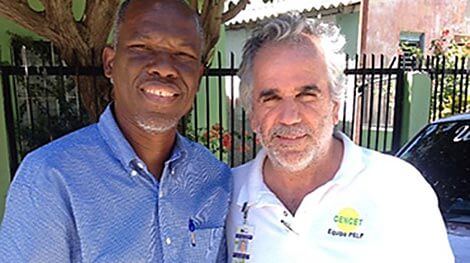 In 2006, the International Task Force for Disease Eradication urged that action be taken to eliminate the mosquito-borne diseases lymphatic filariasis and malaria from Hispaniola. Despite a turbulent history of economic disparity, tensions, and bloodshed, both nations eagerly agreed to binational cooperation, and The Carter Center launched the Hispaniola Initiative to assist them.
Learn more »
In 2006, the International Task Force for Disease Eradication urged that action be taken to eliminate the mosquito-borne diseases lymphatic filariasis and malaria from Hispaniola. Despite a turbulent history of economic disparity, tensions, and bloodshed, both nations eagerly agreed to binational cooperation, and The Carter Center launched the Hispaniola Initiative to assist them.
Learn more »
 Life is hard enough in Haiti, with its profound poverty, natural disasters, and troubled political history. Add to the mix an insidious tropical disease that causes permanent disfigurement, and the result is misery that defies description.
Learn more »
Life is hard enough in Haiti, with its profound poverty, natural disasters, and troubled political history. Add to the mix an insidious tropical disease that causes permanent disfigurement, and the result is misery that defies description.
Learn more »
 As a team of health workers arrives in Chan Bon, a tiny mountainside community south of Port-au-Prince, Haiti, the aromas of lush plants and cooking food hang in the air while clouds play hide-and-seek with the Caribbean sun. A small group of children noisily labors to free a makeshift plastic kite whose string is tangled in a tree.
Learn more »
As a team of health workers arrives in Chan Bon, a tiny mountainside community south of Port-au-Prince, Haiti, the aromas of lush plants and cooking food hang in the air while clouds play hide-and-seek with the Caribbean sun. A small group of children noisily labors to free a makeshift plastic kite whose string is tangled in a tree.
Learn more »
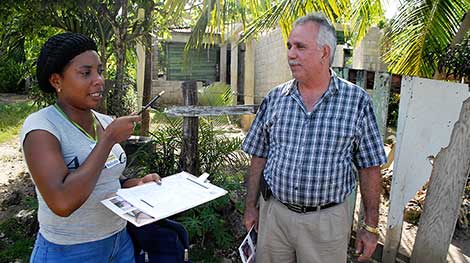 Helping is in Dr. Manuel Gonzales’ nature. It’s not just what he does; it’s who he is. “My vocation is to help people and help my country,” said Gonzales, who became the national manager of the Dominican Republic’s successful Lymphatic Filariasis Elimination Program in April 2001.
Learn more »
Helping is in Dr. Manuel Gonzales’ nature. It’s not just what he does; it’s who he is. “My vocation is to help people and help my country,” said Gonzales, who became the national manager of the Dominican Republic’s successful Lymphatic Filariasis Elimination Program in April 2001.
Learn more »
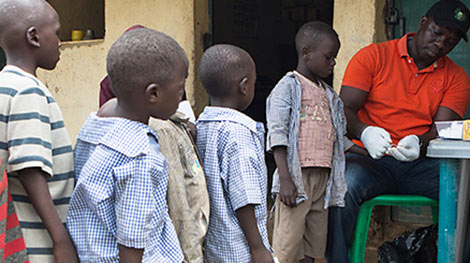 Herded outdoors by their teachers, bright-eyed children chatter, their blue-and-white school uniforms gleaming in a sharp but wiggly queue. Their excitement ebbs just a bit when they reach the front of the line and get a finger pricked by an adult wearing surgical gloves.
Learn more »
Herded outdoors by their teachers, bright-eyed children chatter, their blue-and-white school uniforms gleaming in a sharp but wiggly queue. Their excitement ebbs just a bit when they reach the front of the line and get a finger pricked by an adult wearing surgical gloves.
Learn more »
For these boys, freedom from a disfiguring disease means freedom to pursue their dreams on the diamond. Angel Ciriaco and Rigoberto Bryan are best friends who live in San Pedro de Macoris, a province in the southeastern Dominican Republic. The two 16-year-olds like to talk about school, about girls, and most of all about baseball. Learn more »
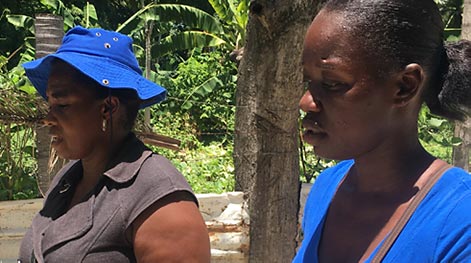 Mirlande Joseph walks the blistering hot, dusty back alleys of Port-au-Prince, greeting people as if she were a politician running for re-election.
“How are you? How is your family? Anyone sick? Did everyone take the medicine when we came by before?”
Learn more »
Mirlande Joseph walks the blistering hot, dusty back alleys of Port-au-Prince, greeting people as if she were a politician running for re-election.
“How are you? How is your family? Anyone sick? Did everyone take the medicine when we came by before?”
Learn more »
Dr. Frank Richards, who directs the Carter Center’s programs on river blindness, lymphatic filariasis, and schistosomiasis, explains why health education matters in the fight to eliminate diseases. Learn more »
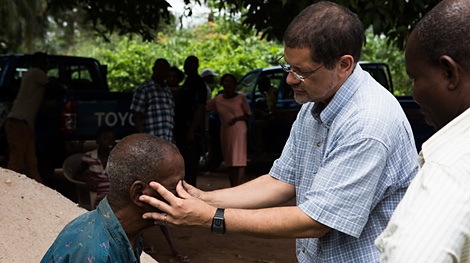 From Guatemala to Nigeria and beyond, Dr. Frank O. Richards Jr. has dedicated most of his adult life to freeing people from the miseries of river blindness. He has been director of the Carter Center’s River Blindness Elimination program since its inception in 1996.
Learn more »
From Guatemala to Nigeria and beyond, Dr. Frank O. Richards Jr. has dedicated most of his adult life to freeing people from the miseries of river blindness. He has been director of the Carter Center’s River Blindness Elimination program since its inception in 1996.
Learn more »
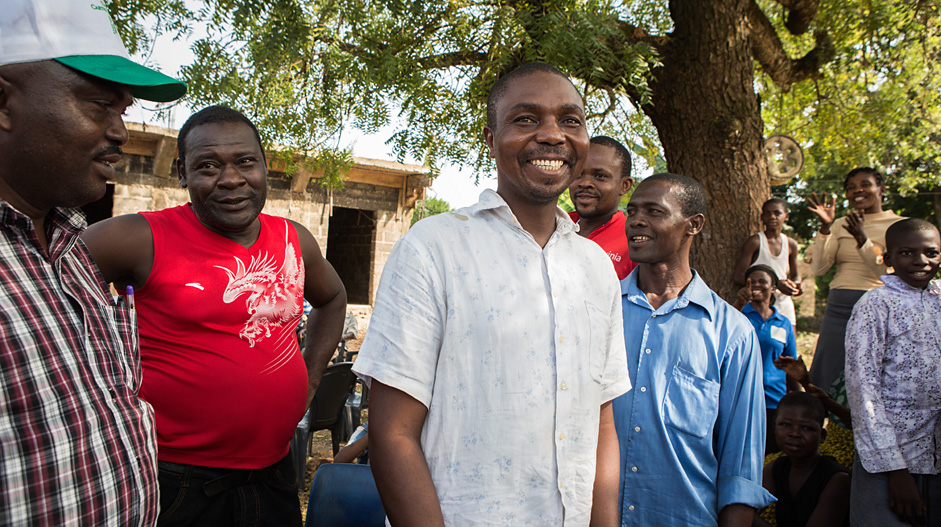 Gabriel Ani, a 40ish farmer and schoolteacher, is the Carter Center-trained community drug distributor in Ndiulo Village, Aninri Local Government Area, Enugu State, southeastern Nigeria.
Learn more »
Gabriel Ani, a 40ish farmer and schoolteacher, is the Carter Center-trained community drug distributor in Ndiulo Village, Aninri Local Government Area, Enugu State, southeastern Nigeria.
Learn more »
By Ambassador (ret.) Mary Ann Peters, chief executive officer
As I write this, The Carter Center is closing in on the distribution of its 500 millionth dose of drugs to combat neglected tropical diseases. That’s half a billion doses of medication given to tens of millions of people suffering or at risk for river blindness, trachoma, lymphatic filariasis, and schistosomiasis. Big institutional milestones are the result of small individual efforts. Learn more »
By Hunter Keys, consultant, Hispaniola Initiative
Parasites keep strange schedules. Those that cause lymphatic filariasis, for example, are mostly active at night. To detect parasites in the blood, health workers will take a nocturnal sample, sometimes as late as 2 a.m. Learn more »
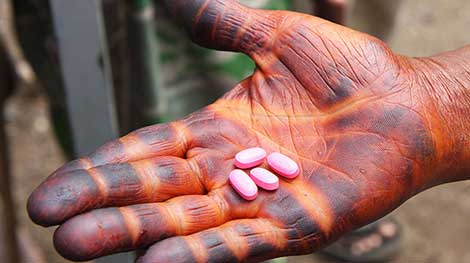 The Carter Center in 2016 surpassed 500 million doses of medication distributed to fight neglected tropical diseases.
Learn more »
The Carter Center in 2016 surpassed 500 million doses of medication distributed to fight neglected tropical diseases.
Learn more »
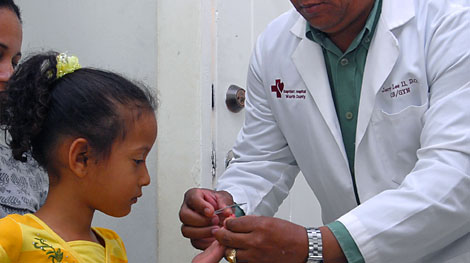 Parasites and bacteria have no respect for international borders. Many international frontiers are marked by rivers and lakes; but the water fleas that host Guinea worm larvae, the mosquitoes that transmit lymphatic filariasis and malaria, and the flies that spread river blindness and trachoma don't care which side they're on.
Learn more »
Parasites and bacteria have no respect for international borders. Many international frontiers are marked by rivers and lakes; but the water fleas that host Guinea worm larvae, the mosquitoes that transmit lymphatic filariasis and malaria, and the flies that spread river blindness and trachoma don't care which side they're on.
Learn more »
By Dr. Gregory Noland, epidemiologist
In honor of Malaria Day in the Americas, we asked Carter Center expert and epidemiologist Dr. Gregory Noland to explain how fighting the disease in Hispaniola differs from strategies employed in Africa. Learn more »
In 2014, Carter Center health programs assisted in the distribution of more drug treatments for neglected tropical diseases (NTDs) than in any previous year, demonstrating the Center’s commitment to alleviating suffering and improving the lives of those who live in the world’s poorest and most isolated communities. Learn more »
The Carter Center began its work in Haiti and the Dominican Republic after a 2006 recommendation by the Center-sponsored International Task Force for Disease Eradication declared it is “technically feasible, medically desirable, and economically beneficial” to eliminate both malaria and lymphatic filariasis from the shared island of Hispaniola. Learn more »
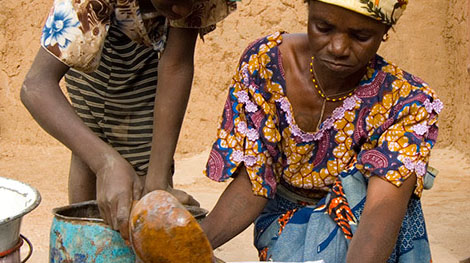 A leader in the eradication and elimination of diseases, The Carter Center is fighting six preventable diseases — Guinea worm, river blindness, trachoma, schistosomiasis, lymphatic filariasis, and malaria — by using health education and simple, low-cost methods.
The following slideshow illustrates some of the fundamental tools and approaches used by The Carter Center to help build a healthier and more peaceful world.
Learn more »
A leader in the eradication and elimination of diseases, The Carter Center is fighting six preventable diseases — Guinea worm, river blindness, trachoma, schistosomiasis, lymphatic filariasis, and malaria — by using health education and simple, low-cost methods.
The following slideshow illustrates some of the fundamental tools and approaches used by The Carter Center to help build a healthier and more peaceful world.
Learn more »
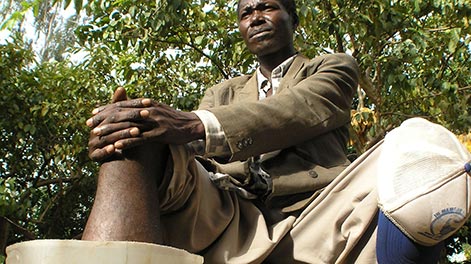 Two horrific diseases in Nigeria — malaria and lymphatic filariasis (LF) — are being targeted for elimination through a new effort to combine prevention activities, which are detailed in a set of co-implementation guidelines issued on February 18, 2014, by the Federal Ministry of Health with support from The Carter Center.
Learn more »
Two horrific diseases in Nigeria — malaria and lymphatic filariasis (LF) — are being targeted for elimination through a new effort to combine prevention activities, which are detailed in a set of co-implementation guidelines issued on February 18, 2014, by the Federal Ministry of Health with support from The Carter Center.
Learn more »
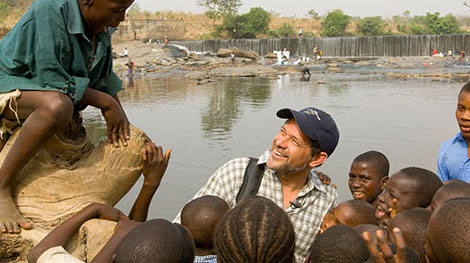 In Guatemala 25 years ago, on a coffee farm situated at the slope of a volcano, Frank O. Richards Jr., M.D., sat under a thinly thatched roof talking with an old man. Chickens foraged on the dirt floor, and a mangy dog slept in the corner.
Learn more »
In Guatemala 25 years ago, on a coffee farm situated at the slope of a volcano, Frank O. Richards Jr., M.D., sat under a thinly thatched roof talking with an old man. Chickens foraged on the dirt floor, and a mangy dog slept in the corner.
Learn more »
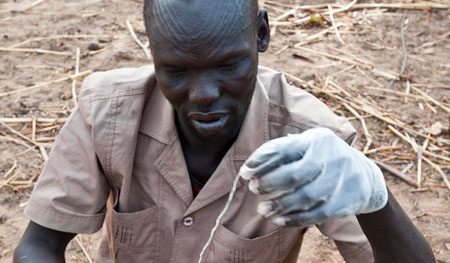 he Carter Center has become a global leader in the eradication and elimination of diseases, focusing efforts to build health and hope in some of the poorest and most isolated places on earth.
Learn more »
he Carter Center has become a global leader in the eradication and elimination of diseases, focusing efforts to build health and hope in some of the poorest and most isolated places on earth.
Learn more »
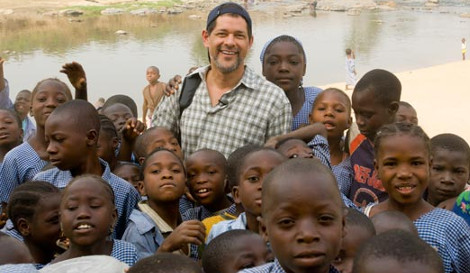 Over the past three years, The Carter Center, in partnership with the Nigeria Ministry of Health, has introduced an innovative way of simultaneously treating several parasitic diseases in Nigeria. In this approach — known as triple-drug treatment — a health worker gives a community member three different medicines at one time that in combination treat river blindness, lymphatic filariasis, schistosomiasis, and several kinds of intestinal worms. In the interview that follows, Frank Richards Jr., M.D., who directs the Center's programs for fighting these diseases, discusses the benefits of the triple-drug approach.
Learn more »
Over the past three years, The Carter Center, in partnership with the Nigeria Ministry of Health, has introduced an innovative way of simultaneously treating several parasitic diseases in Nigeria. In this approach — known as triple-drug treatment — a health worker gives a community member three different medicines at one time that in combination treat river blindness, lymphatic filariasis, schistosomiasis, and several kinds of intestinal worms. In the interview that follows, Frank Richards Jr., M.D., who directs the Center's programs for fighting these diseases, discusses the benefits of the triple-drug approach.
Learn more »
The Carter Center is hosting its 2009 health program reviews March 23-31, 2010, with experts from around the world –including representatives from partner organizations including the Bill & Melinda Gates Foundation, Lions Clubs International, the World Health Organization, UNICEF, and the Centers for Disease Control and Prevention – gathered in Atlanta to assess program status and adopt recommendations for the coming year. Learn more »
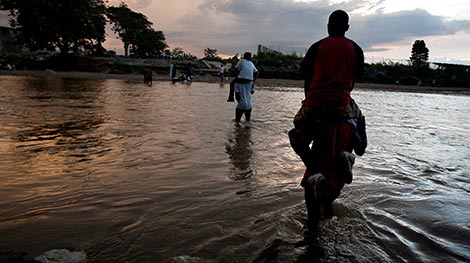 In September 2008, The Carter Center and a binational effort between the Dominican Republic and Haiti launched a historic one-year initiative to help the countries and their other partners accelerate the elimination of two devastating mosquito-borne infections—malaria and lymphatic filariasis.
Learn more »
In September 2008, The Carter Center and a binational effort between the Dominican Republic and Haiti launched a historic one-year initiative to help the countries and their other partners accelerate the elimination of two devastating mosquito-borne infections—malaria and lymphatic filariasis.
Learn more »
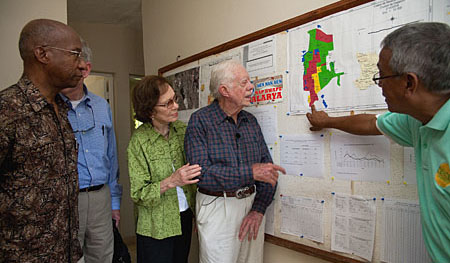 Efforts to eliminate malaria and lymphatic filariasis from the Caribbean island of Hispaniola were underscored Oct. 7-8 during a visit by former U.S. President Jimmy Carter and a Carter Center delegation.
Learn more »
Efforts to eliminate malaria and lymphatic filariasis from the Caribbean island of Hispaniola were underscored Oct. 7-8 during a visit by former U.S. President Jimmy Carter and a Carter Center delegation.
Learn more »
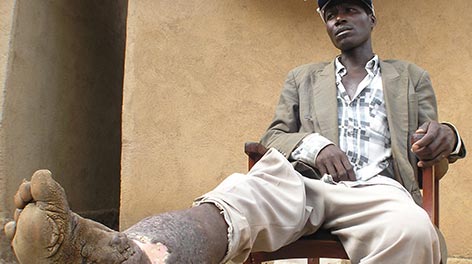 Swathed in a loose-fitting tunic conservatively hiding his deformed right leg, 38-year-old Hamisu Isa pulls up a white plastic chair to join a group of his fellow Nigerians under two mango trees in the city of Jos.
Learn more »
Swathed in a loose-fitting tunic conservatively hiding his deformed right leg, 38-year-old Hamisu Isa pulls up a white plastic chair to join a group of his fellow Nigerians under two mango trees in the city of Jos.
Learn more »
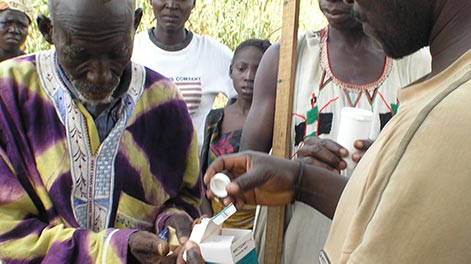 To help combat neglected tropical diseases suffered by millions of people, the Bill & Melinda Gates Foundation has pledged $10 million to fund two groundbreaking Carter Center initiatives in Nigeria.
Learn more »
To help combat neglected tropical diseases suffered by millions of people, the Bill & Melinda Gates Foundation has pledged $10 million to fund two groundbreaking Carter Center initiatives in Nigeria.
Learn more »
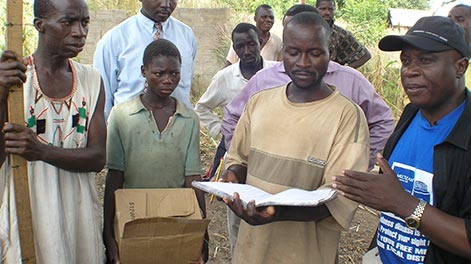 His name means "water" and "life" in the Southeastern region of his native Nigeria, and perhaps no name could be more appropriate for Dr. Emmanuel Miri, resident technical adviser for the Carter Center's health programs in Nigeria.
Learn more »
His name means "water" and "life" in the Southeastern region of his native Nigeria, and perhaps no name could be more appropriate for Dr. Emmanuel Miri, resident technical adviser for the Carter Center's health programs in Nigeria.
Learn more »
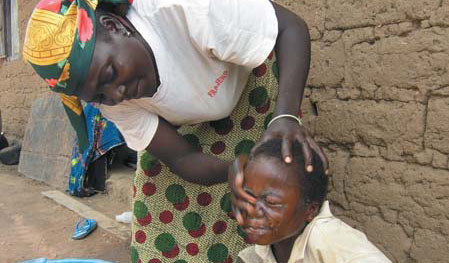 Imagine a nation almost half the size of the United States where large portions of the population are sick -- not with just one disease but several at once. Such is the daily reality for those living in Nigeria, a nation with one of the highest burdens of disease in Africa.
Learn more »
Imagine a nation almost half the size of the United States where large portions of the population are sick -- not with just one disease but several at once. Such is the daily reality for those living in Nigeria, a nation with one of the highest burdens of disease in Africa.
Learn more »
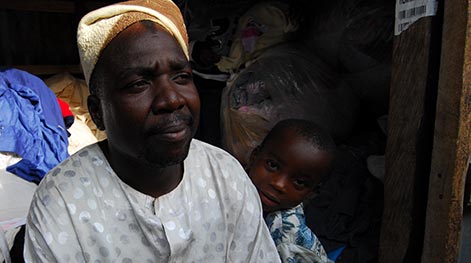 Sitting on a white plastic chair, Hamisu Isa, 35, listens to members of his lymphatic filariasis support group describe their symptoms, challenges, successes, and hopes. For years, he has suffered from the disease's severest form, elephantiasis – a disfiguring condition that causes grotesque swelling of the legs and genitals. But today, Hamisu's life has turned around. He recently earned a teaching certificate, is teaching mathematics and English at a local elementary school a few times a week, and is working in the market part-time.
Learn more »
Sitting on a white plastic chair, Hamisu Isa, 35, listens to members of his lymphatic filariasis support group describe their symptoms, challenges, successes, and hopes. For years, he has suffered from the disease's severest form, elephantiasis – a disfiguring condition that causes grotesque swelling of the legs and genitals. But today, Hamisu's life has turned around. He recently earned a teaching certificate, is teaching mathematics and English at a local elementary school a few times a week, and is working in the market part-time.
Learn more »